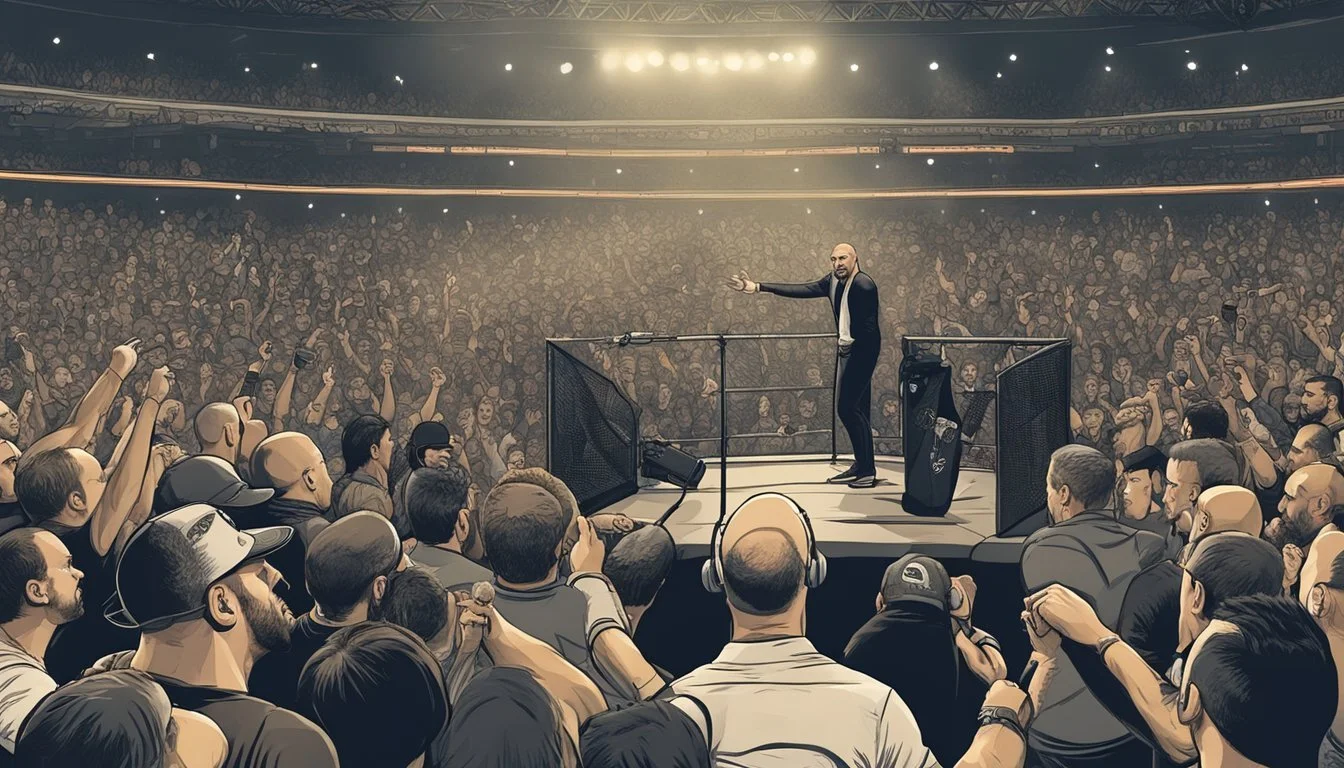Joe Rogan's First UFC Shock: Podcast King's Secret MMA Past and Rise to Power Exposed!
Joe Rogan's association with the Ultimate Fighting Championship (UFC) began long before he became a household name. In 1997, Rogan made his debut appearance at UFC 12, serving as a backstage interviewer. His involvement with the organization quickly evolved, leading to a role as a color commentator starting at UFC 37.
This marked the beginning of Rogan's long-standing relationship with mixed martial arts (MMA) and the UFC. Over the years, his commentary has become an integral part of the UFC viewing experience. Rogan's background in martial arts, combined with his quick wit and ability to break down complex techniques, has made him a valuable asset to the organization.
While Rogan never competed as a fighter in the UFC, his contributions to the sport's growth and popularity are undeniable. His passion for MMA extends beyond commentary, as evidenced by his popular podcast "The Joe Rogan Experience," where he frequently discusses the sport with guests. Rogan's journey from backstage interviewer to respected commentator and influential figure in the MMA world showcases his dedication to the sport and his ability to connect with audiences.
Joe Rogan's Early Life and Career
Joe Rogan was born on August 11, 1967, in Newark, New Jersey. His diverse talents and interests shaped his early career path, leading him to success in comedy and entertainment before transitioning to UFC commentary.
Stand-Up Comedy and Entertainment
Rogan began his stand-up comedy career in 1988 at a Boston comedy club. His quick wit and irreverent style quickly gained attention in the comedy scene. By the early 1990s, he had moved to New York City to pursue his comedic aspirations full-time.
In 1994, Rogan relocated to Los Angeles, where his career took off. He landed roles in several TV shows, including the sitcom "NewsRadio" (1995-1999). Rogan's profile rose significantly when he became the host of "Fear Factor" in 2001, a role he held until 2006 and briefly reprised in 2011.
Transition to Commentary
Rogan's involvement with the UFC began in 1997 when he started working as a backstage interviewer. His knowledge of martial arts and engaging personality made him a natural fit for the organization.
In 2002, Rogan became a color commentator for the UFC, bringing his expertise and enthusiasm to the broadcasts. His commentary style, combining technical insights with humor, resonated with fans and helped popularize the sport.
Rogan's podcast, "The Joe Rogan Experience," launched in 2009, further cementing his status as a prominent media figure. The show covers a wide range of topics, including MMA, comedy, and current events.
Introduction to the UFC
The Ultimate Fighting Championship revolutionized combat sports by pitting martial artists from different disciplines against each other. It quickly gained a reputation for intense, no-holds-barred contests that tested fighters' skills and toughness.
UFC 12: Judgement Day
UFC 12 took place on February 7, 1997, in Dothan, Alabama. This event marked a pivotal moment for the organization, introducing weight classes and tournament formats. The heavyweight and lightweight divisions debuted, with Vitor Belfort winning the heavyweight tournament at just 19 years old.
Mark Coleman claimed the heavyweight title by defeating Dan Severn. The event also featured future stars like Jerry Bohlander and Wallid Ismail. UFC 12 showcased the sport's evolution, moving towards more structured competition while maintaining its raw, exciting atmosphere.
Early UFC Commentary
In the early days, UFC commentary focused on explaining the various martial arts techniques to an audience unfamiliar with MMA. Commentators broke down grappling positions, striking combinations, and submission attempts for viewers.
Jeff Blatnick, an Olympic gold medalist in Greco-Roman wrestling, provided expert analysis. His insights helped educate fans on the intricacies of ground fighting. Bruce Beck handled play-by-play duties, bringing his energetic style to the broadcasts.
Joe Rogan made his UFC debut at UFC 12, conducting backstage interviews. His knowledge of martial arts and enthusiastic delivery would later make him a cornerstone of UFC commentary.
Joe Rogan's Influence in the UFC
Joe Rogan's impact on the UFC extends far beyond his role as a commentator. His unique style and deep knowledge of mixed martial arts have shaped how fans experience and understand the sport.
UFC Commentator Style and Techniques
Rogan's commentary style blends technical expertise with genuine enthusiasm. He breaks down complex fighting techniques in clear, accessible language for viewers. His ability to explain grappling positions and striking strategies enhances fan understanding of the sport.
Rogan's passionate reactions to fights create memorable moments. His excited exclamations during knockouts and submissions have become iconic in UFC broadcasts. He often uses vivid analogies to describe fight action, making it more relatable for casual viewers.
Notable UFC Events and Moments
Rogan has been present for many of the UFC's most historic events. He called Anderson Silva's front kick knockout of Vitor Belfort at UFC 126, providing instant analysis of the rare technique. His commentary during Conor McGregor's 13-second knockout of Jose Aldo at UFC 194 captured the shock and awe of the moment.
At UFC 229, Rogan's live reaction to the post-fight brawl between Khabib Nurmagomedov and Conor McGregor's teams provided crucial context for viewers. His presence at UFC 100 and UFC 200 helped mark these milestone events in the promotion's history.
Expansion to Podcasting and Media
Joe Rogan's career took a significant turn with his entry into podcasting. His show quickly gained popularity, leading to a groundbreaking deal with a major streaming platform.
The Joe Rogan Experience Podcast
In December 2009, Joe Rogan launched "The Joe Rogan Experience" podcast with comedian Brian Redban. The show featured long-form conversations on diverse topics with various guests. Initially met with mixed reception, the podcast gradually built a dedicated following.
Rogan's authentic approach and wide-ranging discussions attracted listeners. He covered subjects from comedy and martial arts to science and politics. The podcast's success grew, with millions of downloads per episode.
Exclusive Deal with Spotify
In 2020, Rogan signed an exclusive licensing agreement with Spotify. The deal, reportedly worth $100 million, moved the podcast to the streaming platform.
This partnership marked a major shift in the podcasting industry. It demonstrated the growing value of popular audio content. The move also sparked discussions about content exclusivity and platform dominance.
Rogan's podcast continued to attract high-profile guests and maintain its audience on Spotify. The deal reinforced his position as a leading figure in digital media.
Joe Rogan's Martial Arts Background
Joe Rogan's martial arts journey spans decades and encompasses multiple disciplines. His training has deeply influenced his career and philosophies.
Brazilian Jiu-Jitsu and Jean Jacques Machado
Rogan began practicing Brazilian Jiu-Jitsu in his twenties. He trained under Jean Jacques Machado, a renowned instructor from the Machado family. Rogan earned his black belt from Machado in 2012 after years of dedicated training.
Brazilian Jiu-Jitsu became a cornerstone of Rogan's martial arts identity. He often discusses its principles and techniques on his podcast. Rogan credits BJJ with teaching him valuable lessons about strategy, leverage, and problem-solving.
Martial Arts Philosophy
Rogan views martial arts as more than just physical training. He sees them as tools for personal growth and self-discovery. His experiences in various disciplines have shaped his outlook on life and work.
Rogan believes martial arts foster discipline, humility, and perseverance. He frequently emphasizes the importance of consistent practice and facing challenges head-on. These principles extend beyond the mat, influencing his approach to comedy, podcasting, and other endeavors.
UFC Ownership and Business Insight
The Ultimate Fighting Championship (UFC) has undergone significant ownership changes and business growth since its inception. These developments have shaped the organization into a mainstream sports powerhouse.
UFC Acquisition by Zuffa
In 2001, Zuffa LLC purchased the UFC for $2 million. The company was founded by Lorenzo and Frank Fertitta, with Dana White appointed as president. This acquisition marked a turning point for the organization, which was struggling financially at the time.
Zuffa implemented crucial changes to legitimize and promote the sport. They worked with athletic commissions to establish rules and weight classes. The new ownership also focused on improving production values and marketing strategies.
Growth and Mainstream Appeal
Under Zuffa's leadership, the UFC experienced rapid growth and increased mainstream appeal. The organization secured television deals, including a landmark agreement with Spike TV in 2005. This exposure introduced MMA to a wider audience.
The UFC expanded internationally, hosting events in new markets. Pay-per-view buys increased significantly, with some events surpassing one million purchases. Celebrity investors and high-profile sponsorships further elevated the UFC's status.
In 2016, WME-IMG (now Endeavor) acquired the UFC for $4 billion, reflecting its tremendous value growth. Dana White remained president, ensuring continuity in leadership and vision for the organization.



